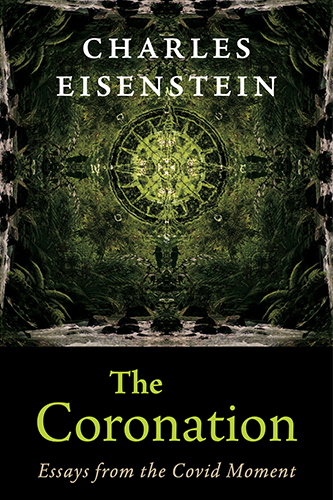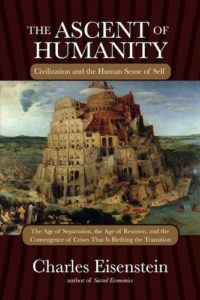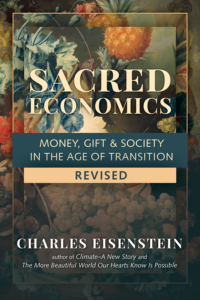The Ascent of Humanity
Chapters
Chapter 2: The Origins of Separation
Keeping Time
The ultimate and perhaps most significant conversion of reality into numbers is the measurement of time. Clocks do to time what name and number do to the material world: they reduce it, make it finite. And what is time, but life itself? Time is experience, process, the flow of being. By measuring time, by converting it into numbers, we rob it of its infinitude and uniqueness in precisely the same way that nouns and numbers reduce the physical world. Time measurement turns a succession of unique moments into just so many seconds, minutes, and hours, and denies the particularity of each person’s subjective experience of them.
The keeping of time began in Neolithic times with the calendar, used to manage the planting of crops. Since calendars are based on natural cycles of the sun, moon, and seasons, their distancing effect is minimal, just as early agriculturalists were still tightly wedded to Nature. Because the measure of time was cyclical and not linear, early calendars did not have the effect of binding time, creating history, and numbering the years of one’s life. Soon, however, with the rise of long-distance commerce and hierarchical government, it became necessary to keep records over a span of years. In Egypt, Mesopotamia, India, China, and Central America, people began to number the years, e.g. from the start of a dynasty, thereby introducing linearity to time and divorcing it from the cycles of Nature. The artificial division of the day into hours (curiously, both the Babylonians and ancient Chinese used twelve) and the Hebrew invention of seven-day weeks only deepened this divorce, which has culminated in the replacement of circular clocks with digital clocks, obliterating the last remaining link between measured time and the cyclical processes of nature.
Crude division of the day into hours was sufficient for the demands of the Iron Age, but industry requires a far more precise coordination of human activity. The development of mechanical clocks in the late Middle Ages set the stage for the Industrial Revolution. As Lewis Mumford put it, “The clock, not the steam engine, is the key machine of the industrial age.”[44] The more finely we divided and measured time, first into hours, then minutes and seconds, the less we seemed to have of it and the more the clock encroached upon and usurped sovereignty over life, until today we are all “on the clock.”
To be punctual is the onus of a slave toward a master or a subject toward a king. Today we are all subject to schedules imposed by the machine requirements of precision, regularity, and standardization. We think of machines as our servants, but our constant rush to be on time says otherwise.
Immersed in linear time measurement, it is hard to appreciate the audacity of dividing up the day into standard units, manmade hours, minutes, and seconds, that are deliberately unconnected to natural processes and therefore “objective.” The idea, to paraphrase Thomas Pynchon, that every second is of equal length and irrevocable is only as recent as the clock.[45] Or as Paul Campos puts it, “Until very recently there was no such thing as ‘6:17 a.m.’”[46]
The clock translates heavenly movement into earthly routine. Time measurement profoundly accelerated human separation from nature. Mumford comments:
By its essential nature, [the clock] dissociated time from human events and helped create the belief in an independent world of mathematically measurable sequences: the special world of science. There is relatively little foundation for this belief in common human experience: throughout the year the days are of uneven duration, and not merely does the relation between day and night steadily change, but a slight journey from East to West alters astronomical time by a certain number of minutes. In terms of the human organism itself, mechanical time is even more foreign: while human life has regularities of its own, the beat of the pulse, the breathing of the lungs, these change from hour to hour with mood and action, and in the longers span of days, time is measured not by the calendar but by the events that occupy it.[47]
In effect, clocks turn time into another standardized, interchangeable part of the World Machine, facilitating the engineering of the world. Only time thus devalued is a conceivable object of commerce. Otherwise, who would sell their moments, each infinitely precious, for a wage? Who would reduce time, i.e. life, to mere money? Leibnitz’ merciless phrase, “Time is money,” encapsulates a profound reduction of the world and enslavement of the spirit.
It is not surprising that the revolutionaries of Paris’s 1830 July Revolution went around the city smashing its clocks.[48] The fundamental purpose of clocks is not to measure time, it is to coordinate human activity. Aside from that it is a fiction, a pretense: as Thoreau said, “Time measures nothing but itself.”[49] Smashing the clocks represents a refusal to sell one’s time, a refusal to schedule one’s life or to bring it into conformity with the needs of specialized mass society. Further, it represents a declaration that “I will live my own life,” establishing the ascendancy of now.
The scheduled and hurried life is the life of a slave, whose life is not his own. A fundamental power over another is to compel them to appear when beckoned: “When I say come, you will come.” To rule a person’s time is to rule his life. In modern society we are chronically busy, too busy to do the things we want to, too busy to stop and smell the roses, too busy to spend an hour looking at clouds, too busy to play games with children, too busy to spend more time on anything than is necessary.
As John Zerzan so poignantly observes, the clock makes “time scarce and life short”; hence the compulsive obsession with speed, efficiency, and convenience in modern technological society. Why else would we seek to get there faster, do it faster, have it faster, except for the belief that our days are numbered? The anxiety of modern society comes in large part from the feeling that there is not enough time. “You’ve always got to be doing something useful. You have to account for every minute of the day in a productive way. If, when you go to sleep at night, you can’t really say that you have used every minute of your time productively, then a piece of your life has flitted by, never to return again. You’ve just squandered it.”[50] After all, any moment could be used to exercise more control over the world, to enhance survival and comfort. Maybe, after we have maximized the possibility of all these things, then we can afford some leisure, play, recreation. Afford? That is a financial metaphor, is it not? Time is money.
To be “at leisure” originally meant not to be subject to the constraints of time; today we schedule in leisure along with everything else, and the freedom to linger at whim by the roadside until good and ready to leave seems a rare luxury. Our leisure is more akin to a prisoner’s furlough. We have lost the primal right to our own time.
The pace of modern life continues to accelerate. In business we have “just-in-time” inventory management, “instantaneous communications,” “same-day turnaround.” We schedule our days more and more tightly, down to the minute, even as we extend the regime of the schedule further and further into childhood, starting with the imposition of hospital schedules on the newborn. “Time management” and “multitasking” have become essential skills in coping with the onrushing deluge of modern life. They are, along with devices such as cell phones and personal digital assistants, technological fixes that apply yet more control to deal with the problems caused by control.
Even as adult life marches to the ever-accelerating beat of the machine, so have the endless afternoons of childhood given way to the scheduled confines of school and other programmed activities. For the first time in history, children are too busy to play.
Consider the tragedy of that statement, let it reverberate in your chest: children are too busy to play. The reason comes down again to survival anxiety. Play is a luxury, a frivolity relegated to the cracks within the schedule of productive, educational, and developmental activities. The competitive demands of adulthood today dictate that no time be wasted in play, because every moment at play is a moment where your child could be getting ahead in life, preparing for the future. After all, play in adulthood is limited to our “time off,” and childhood is preparation for adulthood, is it not? So we seek to instill good “study habits” and a strong work ethic in our children, a sense of responsibility lest they learn to put play, pleasure, and joy first. What kind of adult would they become then? Probably an undisciplined adult who cannot hold a nine-to-five job and has little patience with boring, demeaning, or unpleasant work—the kind of work most of the population accepts as a grim necessity. So school comes first, then homework, then piano practice, then little league soccer. Then, if there is any time left, they can play.
Several years ago I noticed that when I raised my voice at my children, it was usually because of time pressure. Perhaps we had to somewhere at a certain time and they were not cooperating. More often, rather than a specific scheduled obligation, it was a non-specific feeling of anxiety, of time being short, of needing to move on to the next thing. Time scarcity becomes a habit of thought, a way of being.
To force spontaneous, uninhibited little children to conform to adult schedules requires just that: force. My children resisted scheduling. Whatever they wanted to do, they wanted to do it now, and for as long as it took. If we were never in a hurry we would never lose our patience. Today as I integrate the insights of this book into my own life and loosen the hold of time, I find I rarely yell at my children or lose my patience with them, not because I’ve become a saintly person, but simply because there is no reason to. Let them take as long as they want. Okay Matthew, go ahead and play with your socks for half an hour instead of putting them on. Why would I not let a little boy play with his socks? Only if we were “running late” as we chronically are in modern society. Always, the next obligation hangs over our head, keeping us from full devotion to what we are doing. The constant interruption in the natural rhythm of children’s play, which must steal whatever moments it can from the cracks in the adult-imposed schedule, trains us for an adulthood of furtive, hurried pleasures.
As alluded to in the opening chapter, the endemic busy-ness of modern life is one of its defining features, and certainly not a temporary aberration to be abolished with the next generation of futuristic “labor-saving” devices. To be busy is to be unfree; it is to have one’s time constrained. It is to be subject to the priorities of necessity. It is the natural result of a childhood acculturation that yokes our lives to the omnipresent threat of deprivation—of affection, approval, or even of physical comfort. We are by adulthood deeply conditioned against play.
When we say we are too busy, what do we mean? We mean that we have to do other things, priorities dictated by survival; we mean we are not at liberty to do what we want to. “It just would not be practical,” we believe, “to put play before work.” We envision losing our jobs, going bankrupt, ending up on the street. That play can actually be productive without consciously directing it at productivity rarely occurs to us, and when it does we assign it to the province of those lucky few, artists and geniuses, who get to do what they love. But actually the logic is backwards. Genius is the result of doing what you love, not a prerequisite for it. The problem, of course, is discovering what that is. That is what childhood is supposed to be for, but our culture has turned it into the opposite. When we are so thoroughly broken that we know not what we love, the only way out is first to stop doing what we do not love, to do nothing for awhile. This is the message encoded in the Biblical story of Exodus, in which the children of Israel, after fleeing slavery, had to wander the desert for forty years before they found the land of milk and honey. Similarly, we must overthrow the dictatorship of busyness and allow ourselves to wander for awhile, in order to discover our bliss.
The deepest irony of all, and the gravest indication of our servitude, is seen in our aversion to long expanses of empty time. The true slave is made to fear freedom. Thus we fill up our empty moments with “pastimes”; we seek to be “entertained”; that is, to be taken away from ourselves. The underlying anxiety of modern life has robbed us of our moments and bound us to ceaseless doing.
The measurement of time, especially its linear measurement, has among its consequences the concept of an abstract future, another fundamental source of anxiety and insecurity. There is always something to prepare for, always a reason to be incompletely immersed in the now. When we mortgage the present to the future it is usually in the interests of the same practicality we invoke when we “cannot afford to.” Compare our survival anxiety to Marshal Sahlins’ description of hunter-gatherers:
A more serious issue is presented by the frequent and exasperated observation of a certain “lack of foresight” among hunters and gatherers. Orientated forever in the present, without the slightest thought of, or care for, what the morrow may bring, the hunter seems unwilling to husband supplies, incapable of a planned response to the doom surely awaiting him. He adopts instead a studied unconcern. . . [51]
In Sahlins’ “original affluent society,” where Nature provides everything in easy abundance, there is no need to plan for the future. In an agricultural society, though, such nonchalance can be fatal, so it gave way to the time-bound mentality of sowing and reaping that still governs the modern mind. Always, we can be doing something to enhance our rational self-interest, to improve our position in the world, to increase our future security. Things are never okay just as they are when life is at root a struggle for survival. Thus the present becomes slave to the future. That is the defining mentality of agriculture, in which today’s labor brings tomorrow’s harvest. In the eternal present, would work ever supersede play?
A similar phenomenon obtains at the collective level: without the abstractions of future and past there would be no such thing as progress. Conversely, without a concept of progress there is little use for time. The accumulation of culture and technology defines an arrow of time by reference to simpler days. Early on in this exponential ascent, when change was slow, only the most rudimentary consciousness of time existed. As change built upon itself, the awareness of time crystallized as well.
Time was not an invention that could have been refused had only we been wiser. Rather, it was an inevitable product of the progression of language, number, and technology, each of which built upon itself and the others. Written language, for example, which was originally used for record-keeping, allowed the linear binding of time and the conception of history, as words were no longer confined to a moment.
Because it is inextricably tied up with speed, convenience, efficiency, and progress, technology as we know it is rooted in reified, linear time. This invites the question as to whether any other conception of technology is possible. It is difficult to imagine. It would seem that any technology which builds upon itself thereby defines progress and therefore linear time. However, progress need not be unnatural or destructive. Life, after all, has evolved into forms of increasing complexity over four billion years, only veering into planetary crisis in the last few thousand. This suggests a different mode of technology, which seeks explicitly to recover and harmonize with nature’s patterns. Such technology actually has a precedent in the magical practices of primitive peoples, which sought, in John Zerzan’s words, “the regularity, not the supersession, of the processes of nature.” Post-technology technology, if I may use such a phrase, will take as its model the cycles of nature and in particular, the “magical” practices of ancient people. It will seek attunement and not conquest, and it will be occupied not with control but with beauty. This mode of technology, which I will describe later in the book, will not be a separation from nature at all, but rather an organic extension of nature that will return us to a timeless life in which linear time measurement is but a plaything.
[44] Mumford, Lewis, Technics and Civilization , Harcourt, Brace & Co. 1963, c1934. p. 14, cited by Zerzan, p. 23
[45] Pynchon, Thomas, “Nearer, my Couch, to Thee,” New York Times Book Review, June 6, 1993.
[46] Campos, Paul F., Jurismania: The Madness of American Law, Oxford University Press, 1998. p. 32
[47] Mumford, Technics and Civilization, p. 15
[48] Zerzan, p. 24
[49] Thoreau, p. 255
[50] Greenberg, Daniel, “When does a Person Make Good Use of His Time?” The Sudbury Valley School Experience, Mimsy Sadofsky and Daniel Greenberg eds., Sudbury Valley School Press, 1992. p. 105.
[51] Marshal Sahlins, “The Original Affluent Society.” Excerpted from Stone Age Economics.






